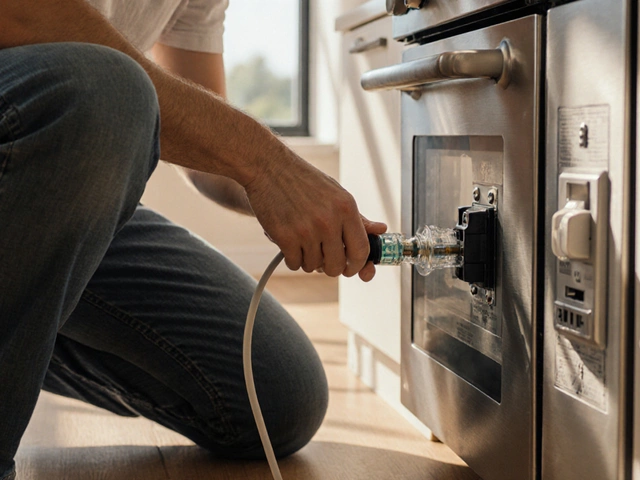Ever looked at your electricity bill and wondered why it climbs every month? The culprit is often the appliances you rely on every day. Swapping to energy efficient models can shave off pounds from the bill, keep your home comfortable, and shrink your carbon footprint. The good news? You don’t need to overhaul everything at once – a few smart choices go a long way.
First off, efficient appliances use less power to do the same job. A modern fridge with a good seal and a smart compressor can use up to 40% less energy than a ten‑year‑old model. The same principle applies to washing machines, dryers, ovens, and even heat pumps that both heat and cool your home. When you pick an appliance with a high energy rating, you’re paying a bit more up front but saving big on running costs.
Second, many energy‑saving models come with extra features that actually improve performance. For example, an electric oven with a convection fan spreads heat evenly, meaning you often need lower temperatures or shorter cooking times. A dishwasher that senses load size adjusts water usage automatically. Those little tech upgrades translate into real savings.
Lastly, going green isn’t just about the wallet. Lower energy consumption means fewer emissions from power plants, which helps the planet. In the UK, the government rewards households that meet certain efficiency standards, so you might even qualify for grants or tax breaks.
1. Read the label. Look for the Energy Rating label – the greener the letter, the better. For larger appliances like heat pumps, check the Seasonal Coefficient of Performance (SCOP) – the higher, the more efficient.
2. Size matters. A massive fridge in a small kitchen wastes energy. Choose a size that matches your household’s needs. Same goes for washing machines; a 7kg drum is perfect for a family of four, but a 5kg unit is smarter for a couple.
3. Keep it clean. Dusty condenser coils on fridges or blocked filters on extractors force the motor to work harder. A quick wipe‑down every few months restores efficiency.
4. Use the right settings. Many ovens and hobs have eco‑modes that lower temperature slightly without compromising results. Running dishwashers and washing machines on eco‑cycles saves both water and electricity.
5. Maintain heat pumps. Regularly check filters and schedule yearly professional servicing. A well‑maintained heat pump can last 15‑20 years and keep heating bills low even in chilly winters.
6. Don’t over‑fill. Whether it’s a dishwasher or washing machine, cramming too much in reduces cleaning performance and makes the motor work harder.
7. Upgrade wisely. If an appliance is more than 10‑12 years old, the cost of repair often outweighs the savings from a newer, efficient model. Use our guide on appliance lifespans to decide when it’s time for a replacement.
By following these tips, you’ll see a noticeable drop in your energy bills and enjoy appliances that work like new for longer. Remember, every small change adds up – the next time you’re shopping, let the energy rating steer your decision.

Curious about what counts as an appliance? Get concrete examples, clever tips, and practical facts about home appliances to make smart choices for your household.

Thinking about whether to repair an 8-year-old oven? This article digs into the real costs and benefits, from repair bills to how long ovens actually last. You'll get tips on diagnosing simple issues yourself, signs to look for before calling a pro, and how energy efficiency compares between old and new models. See how warranties, brand reputation, and parts availability impact the final call. Get advice that’s practical, straight-up, and doesn’t waste your time.

Deciding whether to repair or replace a laptop can be challenging. This guide explores the costs, benefits, and considerations involved in repairing a laptop. Learn when it's worth diving into a repair and when it's best to shop for a new device, along with tips on DIY repairs and choosing a reliable repair service.

When your boiler breaks down, taking a comfortable shower suddenly feels like a luxury. This article explains exactly what happens to your shower when a boiler goes out, ways to still get clean, and when you should call in a professional. Learn alternative methods for washing, bust some myths about cold showers, and get tips on preventing future breakdowns. We even cover what to do if you have kids or need to keep up with fitness routines. Staying clean during a crisis isn’t impossible—you just need a bit of know-how and some creative solutions.

Learn why your electric oven suddenly stopped working, diagnose power, element, thermostat or safety fuse issues, and decide when to DIY or call a repair professional.

Wondering how long your water heater should last? This article dives into the expected lifespan of various types of water heaters, factors impacting their longevity, and signs it might be time for a replacement. With practical tips on maintenance, you can extend the life of your heater and avoid breakdowns. Learn what to watch out for to ensure you have hot water when you need it, without unexpected surprises.